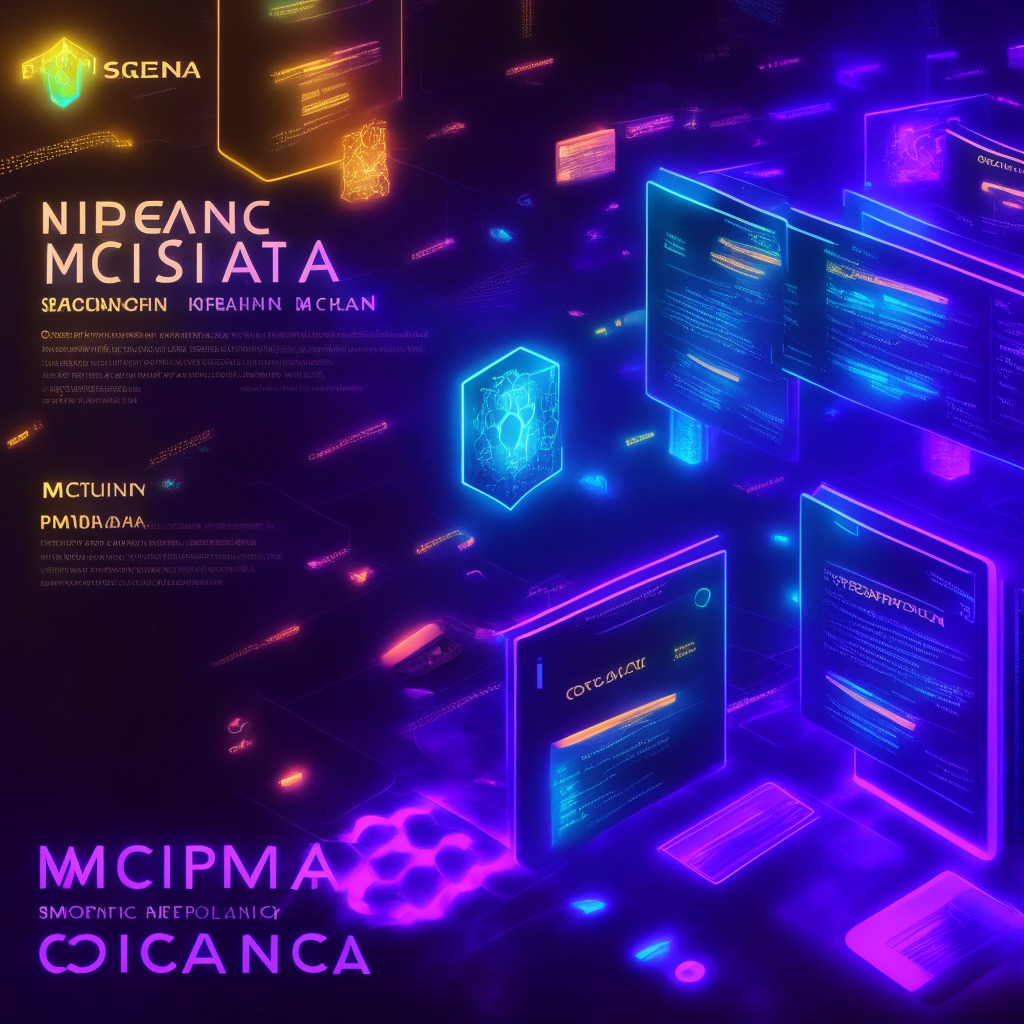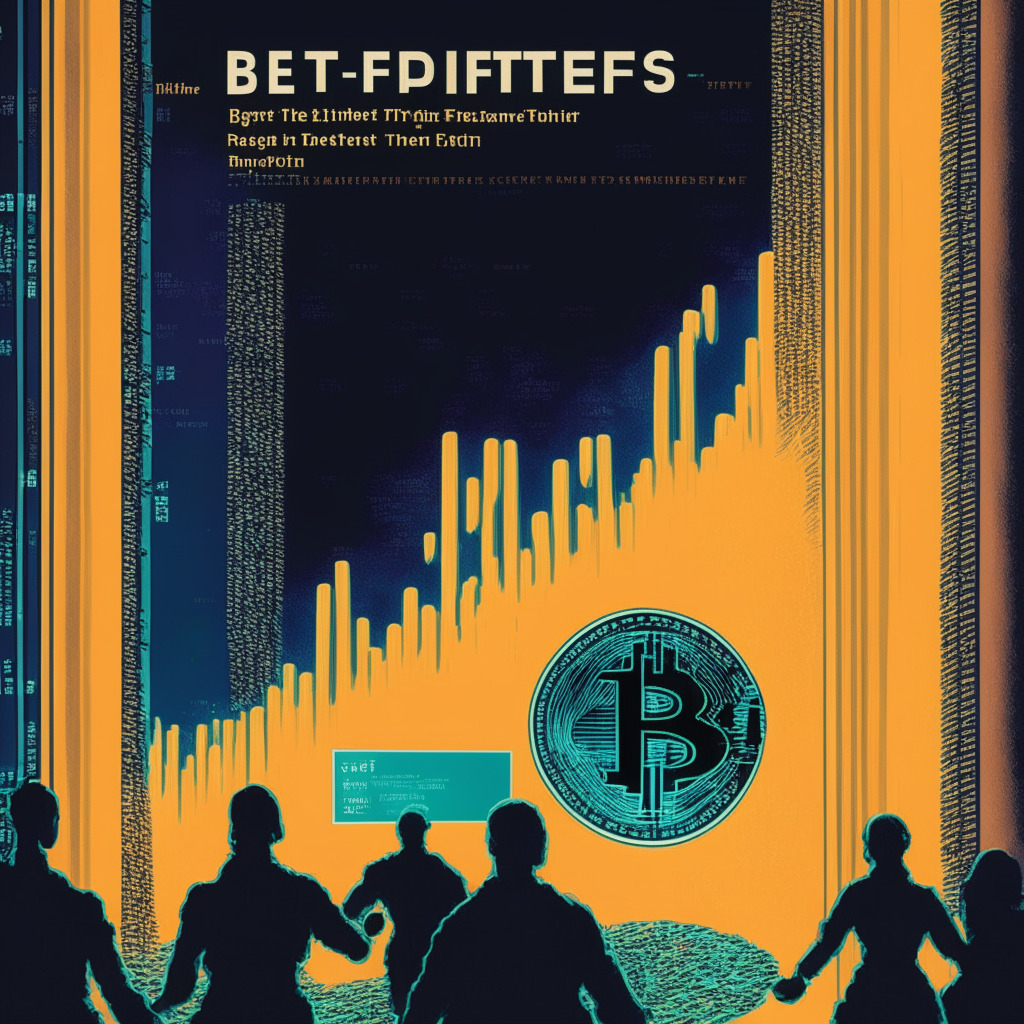Crypto startups received approximately $56 million in funding this week, focusing mainly on DeFi and NFT-related projects. Blockworks secured the largest sum of $12 million, while Pudgy Penguins obtained $9 million and Odsy Network collected $7.5 million. These figures reflect the continued flow of investments into the crypto and Web3 sectors.
Search Results for: Blockworks
Blockworks’ $12M Funding: Savior for Crypto Media or Hurdle in Ethical Reporting?
Blockworks recently secured $12 million in funding to expand its research and data analytics platform, Blockworks Research, valued at $135 million. Despite challenges within the crypto media industry, this investment demonstrates investor confidence in the potential of crypto-focused publications, aiming to provide quality information to the rapidly evolving market.
Exploring BALD Coin Controversy: Is SBF the Mysterious Mastermind or an Innocent Bystander?
A recent controversial revelation links Sam Bankman-Fried (SBF), the alleged mastermind behind the BALD memecoin that humorously refers to Coinbase CEO Brian Armstrong. After BALD’s dramatic initial trading gain, an 85% price drop sparked allegations of a ‘rug pull’. Blockchain enthusiasts link the Ethereum wallet behind BALD’s deployment to SBF with evidence showing substantial funds transfers from FTX and Alameda Research-associated wallets. However, amid these rumors, the crypto community awaits concrete proof before drawing conclusions.
Public vs Private Blockchains: Leveraging Permissioned Systems for Secure Asset Tokenization
The potential of blockchain technology in improving settlement through asset tokenization is acknowledged, but skepticism arises about the viability of public blockchains. The solution lies in public permissioned blockchains, which provide security, scalability, transparency, and regulatory compliance while preserving decentralization. These blockchains are beneficial for financial markets and decentralized finance (DeFi) onboarding with the right infrastructure.
BlackRock ETF Filing: A Boon or Bane for Grayscale’s GBTC Future and Crypto Market
BlackRock’s recent spot Bitcoin ETF filing has raised questions about Grayscale’s future strategy. If Grayscale successfully converts its current structure into an ETF, it may benefit from reduced pricing deviation and enable 1:1 equivalent redemption between GBTC shares and Bitcoin. However, the SEC’s rejection of Grayscale’s 2022 ETF application remains a challenge.
Leveraged Bitcoin ETFs: Expanding Investment Options or Risky Endeavor?
Volatility Shares is set to launch its 2x Bitcoin Strategy ETF (BITX) this week, offering leveraged exposure to bitcoin futures. This eliminates the need for crypto exchange accounts amid legal uncertainties and follows multiple ETF applications, highlighting the importance of regulation and oversight in the evolving cryptocurrency landscape.
Crypto Bill Debate: Balancing Investor Protection and Market Innovation
Rep. Maxine Waters seeks input from the US Treasury Department and the SEC on the potential impact of the latest crypto bill proposed by Republicans. She questions the bill’s effectiveness in protecting investors, changing the roles of the SEC and Treasury in the crypto market, and its possible threat to financial market stability. The outcome could significantly shape the future of crypto businesses and industry-wide regulations.
SAP Tests USDC Stablecoin Payments: Examining Blockchain’s Impact on Cross-Border Transactions
SAP is testing cross-border stablecoin payments using USDC on Ethereum’s Goerli testnet, aiming to improve international financial transactions. Their blockchain-based solution may offer a more efficient, transparent and cost-effective alternative to traditional cross-border payments, eliminating intermediaries and reducing fees.
Recovering $7 Billion from FTX Exchange: Progress, Trust, and the Road Ahead
Debtors recovered about $7 billion from FTX exchange, though still short of $8.7 billion owed to customers. The process of tracking assets was challenging due to commingling and misuse of customer deposits, revealing mismanagement and raising concerns about safety of cryptocurrency exchanges.
Binance’s European Exodus: Balancing Innovation and Regulation in the Crypto Industry
Binance’s withdrawal of its license application from Austria and recent exits from Netherlands and Cyprus highlight the growing impact of regulatory scrutiny on the crypto industry’s future in Europe, and the ongoing tension between innovation and regulation.
Binance Reverses Privacy Coin Delisting: Unpacking the Decision and Industry Implications
Binance reverses its decision to delist privacy coins in some EU nations, citing revised classification for compliance with EU regulations. The exchange must now follow regulations requiring transaction monitoring for listed coins. Binance’s approach raises questions about its decision-making process and response to regulatory requirements.
Fordefi Integrates with Solana: The Future of Institutional MPC Wallets and Security Debate
Institutional MPC wallet company Fordefi plans to integrate its native wallet with Solana-based applications and protocols. Fordefi’s advanced security features, such as transaction simulation and policy management tools, cater to institutional needs and have attracted clients like Keyrock and DeFiance Capital. The success of this integration will depend on the market’s value and adaptation to advanced security measures.
Bitcoin Heated Pools and Beyond: Unleashing Crypto Mining’s Creative Potential
Imagine taking a dip in water warmed by bitcoin miners; a unique system uses heat exchangers to transfer the heat produced from ASICs to the water. Cryptocurrency enthusiasts are finding creative ways to incorporate mining into daily life, from heating pools to powering greenhouses and calming noisy infants.
Bybit’s Cyprus Expansion: Boosting Crypto Access or Stifling Competition?
Crypto exchange Bybit receives a license to operate in Cyprus, allowing 1.2 million residents access to the world’s fourth largest centralized exchange. As Cyprus aspires to become a global crypto hub, striking a balance between compliance, innovation, and market accessibility remains crucial.
Blockchain Revolution for Cross-Border Payments: Pros, Cons, and the Main Conflict
SAP, an enterprise software company, is testing blockchain solutions for cross-border payments using stablecoin USDC, potentially addressing international payment challenges. Despite skepticism, progress continues toward overcoming friction points, reducing costs, and increasing ease of use for global transactions through blockchain technology and stablecoins like USDC.
Ethereum-Compatible ZK Stack: The Open-Source Future of Customized Layer-2s & Layer-3s
The ZK Stack, an open-source framework for developing zk-rollups and layer-3 hyperchains, offers Ethereum-compatible, customizable, and secure solutions for developers prioritizing sovereignty. Its modularity, composability, and adaptability make it ideal for a variety of applications, including gaming, decentralized exchanges, and private permissioned chains.
DeFi Investments Surge as Startups Secure $49.9M: Exploring Opportunities and Challenges
This week, 14 cryptocurrency startups secured a total of $49.9 million in funding, primarily in the decentralized finance (DeFi) sector. Major beneficiary dtcpay raised approximately $16.5 million in a pre-Series A round, focusing on providing payment solutions for fiat and cryptocurrencies. The expansion of DeFi investments highlights a promising future for DeFi integration into the broader economy.
Bipartisan Support: The Key to Unlocking Crypto Legislation on Capitol Hill
This article discusses the current market structure discussion draft for crypto legislation, proposed by House Republican Committee leaders Patrick McHenry and Glenn Thompson. While it faces political challenges, it could serve as a foundation for future bipartisan crypto regulation.
Blockchain vs. AI Fake News: Can Crypto Tech Save the Media Industry?
Blockchain technology could potentially save the media industry from AI-driven fake news by introducing “sign-and-trace” systems for content authentication. This would enable reliable sourcing, validation, and tracking of real news stories, promoting transparency and combating misinformation.
Eminem’s Bored Ape NFT Reignites Debate on Market Future and Investing Risks
Rumors claiming Eminem sold his Bored Ape NFT are unfounded, as blockchain records show it remains in his possession. Despite struggling NFTs and downward market trends, Eminem’s Bored Ape received a current best offer of 35 wrapped ether, roughly $67,000.
VanEck vs BlackRock: Unraveling the Bitcoin ETF Approval Race and SEC Scrutiny
VanEck recently revised its Bitcoin ETF bid to address SEC concerns and urged the regulator to treat all filings equally. The race for the first-mover advantage in the Bitcoin ETF space has intensified, with firms like BlackRock, Bitwise, WisdomTree, Invesco, and Valkyrie joining the fray.
TrueUSD Under Attack: Prime Trust Insolvency Sparks Short Frenzy and Skepticism
After Prime Trust insolvency, traders are shorting stablecoin TrueUSD (TUSD) despite TUSD denying exposure to Prime Trust. TUSD’s Curve Pool reserves hit 61% and short bets continue to rise. Investors must carefully assess risks surrounding TUSD’s connection to Prime Trust and its ability to maintain its $1 peg before making decisions.
Circle’s Ties to Collapsed SVB: Stablecoins’ Resilience and Lessons in Risk Management
The now-collapsed Silicon Valley Bank (SVB) reportedly had Circle as its single largest asset-weighted customer, holding $3.3 billion at the time of collapse. The incident raises questions about stablecoins like Circle’s USDC and underlines the importance of due diligence and contingency planning in the crypto industry.
IMF’s Stance on Crypto and CBDCs in Latin America: Accelerated Adoption vs. Regulations
The IMF discusses the accelerated adoption of cryptocurrencies and CBDCs in Latin American and Caribbean countries, stating that well-designed CBDCs could simplify remittances and financially include more citizens. However, they emphasized the need for proper regulation and consider crypto to be risky overall.
Ether ETFs: A Real Possibility or Just Publicity Stunts? Analyzing SEC’s Stance on Approval
The fate of not-yet-filed ether funds depends on the SEC’s treatment of the latest wave of spot bitcoin ETF filings. A bitcoin ETF approval might encourage fund issuers to try ether next, while regulatory clarity could increase ether ETF’s chances in the future.
Spain Embraces Crypto.com: Balancing Regulation and Innovation in the EU Crypto Market
Spain registers Crypto.com as a virtual asset service provider under the Bank of Spain, demonstrating its commitment to creating a regulator-friendly environment for cryptocurrency-related ventures, while protecting users and supervising crypto trading activities.
Maker Ecosystem $1.16M Settlement: Lessons on Crypto Regulation and Investor Protection
Maker ecosystem firms have agreed to a $1.16 million settlement with investors over financial losses during the “Black Thursday” COVID crash in March 2020. The class-action lawsuit claimed Maker Foundation and related entities misrepresented risks of collateralized debt positions, resulting in $8.3 million losses. This case highlights the importance of regulatory oversight, balancing innovation and investor protection.
Crucial Role of Surveillance-Sharing Agreements in Bitcoin ETF Approvals: Pros and Cons
Surveillance-sharing agreements are crucial in evaluating proposed bitcoin ETFs to prevent fraud and manipulation. Exchanges must demonstrate such agreements with regulated markets related to the underlying bitcoin assets. However, adequate surveillance systems remain unestablished, and regulatory bodies remain cautious in approving ETF proposals.
CACEIS Registers as Digital Asset Provider: Balancing Decentralization and Regulation in France
Credit Agricole’s CACEIS, a joint venture with Santander, recently registered as a digital asset services provider in France. The European Union has adopted the Markets in Crypto Assets (MiCA) framework, aiming to establish comprehensive regulations for cryptocurrencies in Europe, implementing environmental safeguards, supervisory provisions, and consumer protections. French market demonstrates openness to digital assets while balancing decentralization with stricter licensing requirements.
Etherscan’s Code Reader: A Glimpse into Smart Contracts with OpenAI’s Help
Etherscan is beta testing a new feature called Code Reader that allows users to query OpenAI’s large language model for researching solidity smart contracts. This intuitive tool provides valuable insights for developers and non-developers to better understand smart contract operations and functionality. However, it shouldn’t be relied upon in isolation.
BitGo-Prime Trust Acquisition Collapse: Lessons and Future of Crypto Mergers
BitGo terminated its plans to acquire Prime Trust, a US-based crypto company, citing ongoing issues with Prime Trust’s deposits. This development raises questions about the future of mergers and acquisitions in the crypto industry, highlighting the importance of regulation and oversight for the sector’s stability and growth.
Nansen and Kaiko: Uniting Data for Deeper Crypto Market Insights – A Double-Edged Sword?
Nansen and Kaiko’s partnership aims to provide comprehensive insights into transactions across centralized and decentralized exchanges. This collaboration offers a “holistic view” of the cryptocurrency market, allowing users to access combined datasets and make more informed investment decisions. However, the dominance of centralized exchanges raises concerns about their influence on the entire market.































